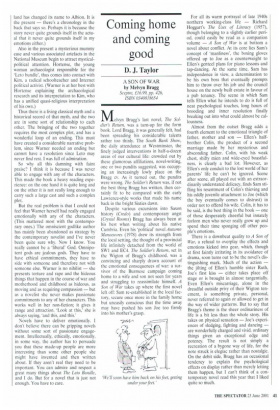Coming home and coming good
D. J. Taylor
A SON OF WAR by Melvyn Bragg Sceptre, £16.99, pp. 426, ISBN 0340818654 Melvyn Bragg's last novel, The Soldier's Return, was a turn-up for the form book. Lord Bragg, it was generally felt, had been spreading his considerable talents rather too thinly. The South Bank Show, the daily attendance at Westminster, the finely judged interventions in half-a-dozen areas of our cultural life: crowded out by these glamorous affiliations, novel-writing, one or two pundits suggested, was occupying an increasingly lowly place on the Bragg cv. As it turned out, the pundits were wrong. The Soldier's Return was, if not the best thing Bragg has written, then certainly fit to be compared with the early Lawrence-style works that made his name back in the bright Sixties dawn.
Despite various excursions into Saxon history (Credo) and contemporary angst (Crystal Rooms) Bragg has always been at his best when writing about his native Cumbria. Even his 'political' novel Autumn Manoeuvres (1978) drew its strength from the local setting, the thought of a provincial life infinitely detached from the world of SW1 and EC4. The Soldier's Return, set in the Wigton of Bragg's childhood, was a convincing and sharply drawn account of the emotional consequences of war: a survivor of the Burmese campaign coming home to a wife and son not seen for years and struggling to reassimilate himself. A Son of War takes up where the first novel left off: Sam re-established in the local factory, secure once more in the family home but uneasily conscious that the time away may have pushed his son Joe too firmly into his mother's grasp. For all its warm portrayal of late 1940s northern working-class life — Richard Hoggart's The Uses of Literacy (1957), though belonging to a slightly earlier period, could easily be read as a companion volume — A Son of War is at bottom a novel about conflict. At its core lies Sam's concept of 'manliness', the boxing gloves offered up to Joe as a counterweight to Ellen's genteel plans for piano lessons and tap-dancing. At the same time, Sam has independence in view, a determination to be his own boss that eventually prompts him to throw over his job and the council house on the newly built estate in favour of a pub tenancy. The scene in which Sam tells Ellen what he intends to do is full of neat psychological touches, long hours of brooding and inner resolution finally breaking out into what could almost be callousness.
Almost from the outset Bragg adds a fourth element to the emotional triangle of father, mother and son — Ellen's halfbrother Colin, the product of a second marriage made by her mysterious and absconding father. Colin, with his weak chest, shifty mien and wide-eyed boastfulness, is clearly a bad lot. However, as Ellen's only conduit to the lost world of her parents' life he can't be ignored. Scene after scene, all played out with an extraordinarily understated delicacy, finds Sam stifling his resentment of Colin's thieving and his oddly juvenile attachment to Joe (which the boy eventually comes to distrust) in order not to offend his wife. Colin, it has to be said, is the best thing in the book — one of those desperately cheerful but innately forlorn men who never really grow up and spend their time sponging off other people's emotions.
There is a downbeat quality to A Son of War, a refusal to overplay the effects and emotions kicked into gear, which, though at first faintly irritating in its avoidance of drama, soon turns out to be the novel's distinguishing mark. Much of the action — the jilting of Ellen's humble sister Ruth, Joe's first kiss — either takes place off stage or is brought in almost tangentially. Even Ellen's miscarriage, alone in the dreadful outside privy of their Wigton tenement, is something private, personal, never referred to again or allowed to get in the way of wider patterns. But to say that Bragg's theme is the sheer ordinariness of life is a bit less than the whole story. His takes on physical sensation — Joe's experiences of sledging, fighting and dancing — are wonderfully charged and vivid, ordinary things given an exceptional edge and potency. The result is not simply a recreation of a bygone way of life, for the note struck is elegiac rather than nostalgic. On the debit side, Bragg has an occasional tendency to explain the psychological effects on display rather than merely letting them happen, but I can't think of a contemporary novel read this year that I liked quite so much.


































































 Previous page
Previous page